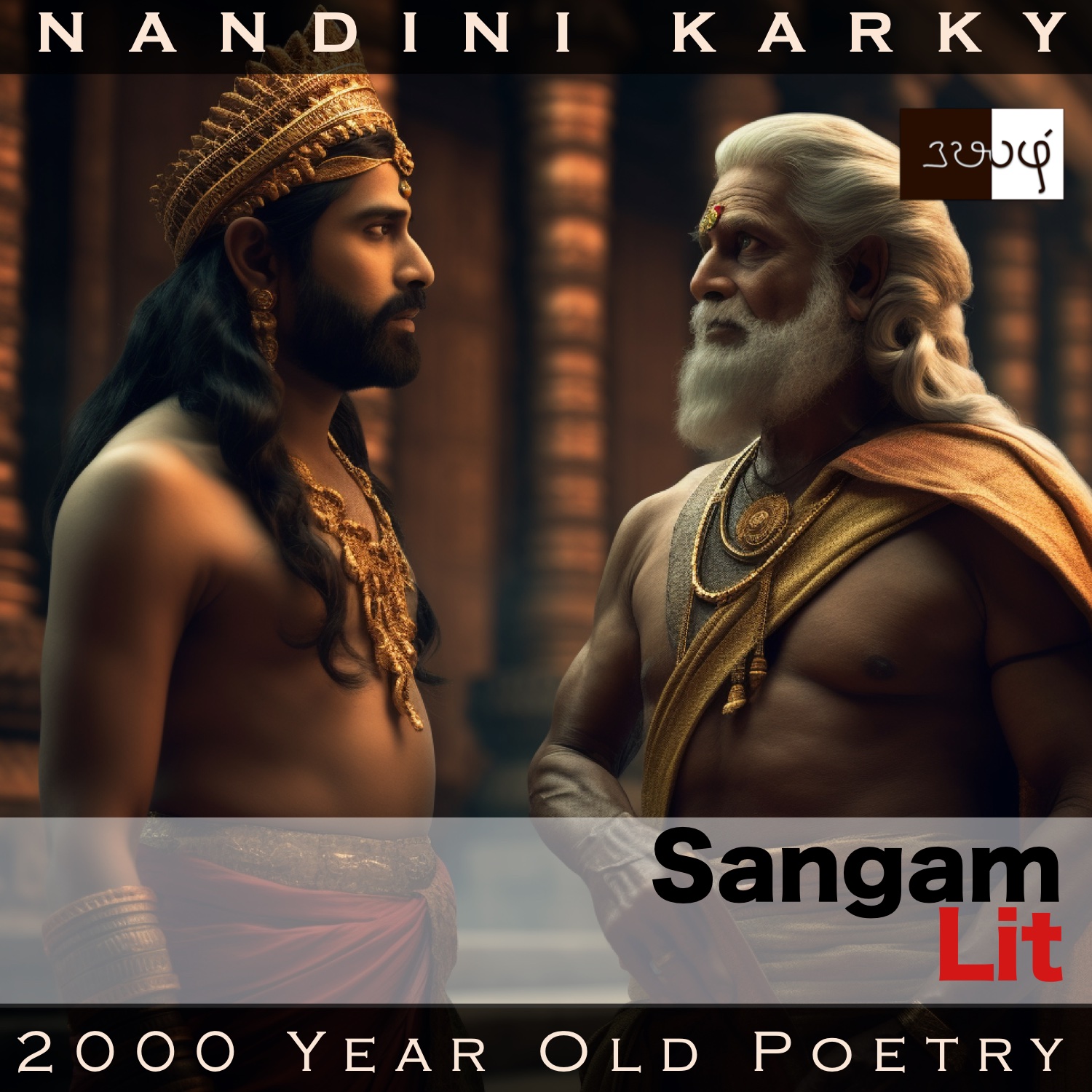Podcast: Play in new window | Download
Subscribe: Apple Podcasts | Spotify | Amazon Music | Android | iHeartRadio | Email | TuneIn | RSS | More
In this episode, we encounter an interesting situation involving two kings and a poet, as depicted in Sangam Literary work, Puranaanooru 151, penned on the Velir King Ila Vichiko by the poet Perunthalai Saathanaar. The verse is situated in the category of ‘Paadaan Thinai’ or ‘King’s praise’ and relates reasons on why the king is not sung about by poets.

பண்டும் பண்டும் பாடுநர் உவப்ப,
விண் தோய் சிமைய விறல் வரைக் கவாஅன்,
கிழவன் சேட் புலம் படரின், இழை அணிந்து,
புன் தலை மடப் பிடி பரிசிலாக,
பெண்டிரும் தம் பதம் கொடுக்கும் வண் புகழ்க்
கண்டீரக்கோன்ஆகலின், நன்றும்
முயங்கல் ஆன்றிசின், யானே; பொலந் தேர்
நன்னன் மருகன் அன்றியும், நீயும்
முயங்கற்கு ஒத்தனை மன்னே; வயங்கு மொழிப்
பாடுநர்க்கு அடைத்த கதவின், ஆடு மழை
அணங்கு சால் அடுக்கம் பொழியும் நும்
மணம் கமழ் மால் வரை வரைந்தனர், எமரே.
It’s one of those verses where the situation is fascinating. This happens in the court of another king Ilan Kandeerakko, where this king is meeting with his friend and king of another clan Ila Vichiko. Just then, the poet comes to their court and sees them both. He embraces only Ilan Kandeerakko and avoids the other king. So, when this king Ila Vichiko questions the poet frankly about the perceived insult, the poet replies to him with the words that can be translated as follows:
“To the delight of those who sing praises in the long gone past, when the lords of the sky-soaring mountains had parted away to a far-off country, wearing jewels, their women would take their place, and offer soft-haired, naive, female elephants as gifts to poets. Such is the famous clan that Kandeerakko comes from. That’s why I embraced him. You would have been embraced too had you not been born in the clan of Nannan with gold-decked chariots. Not only that, since they shut the gates to those who sing with exquisite words, our people have stopped coming to the fragrant slopes in your fearsome mountain, showered upon by swaying clouds!”
Time to take a deeper look at the thoughts herein. The poet talks about the clan of Ilan Kandeerakko, the king he embraced, and says that is a clan wherein even when the menfolk are away on work to some far-off country, the women would wear jewels so as to render gifts to the poets, who come singing to their mansions. Let’s pause for a moment and understand what this signifies. We have seen in so many recent poems that when a man is away, his woman avoids dressing herself up. But here we see that the women mentioned by this poet break that tradition because they think something else is more important than abstaining from luxuries in their men’s absence, and that is being generous to the poets, who have come to their houses, singing the praises of their husbands. So, a king born in such a noble clan is worthy of my embrace, the poet implies. Next, he turns to the king questioning him and says, ‘Surely I would have embraced you too had you not been in born in the clan of Nannan”. Not just that, your ancestors were known for shutting the gates to singing bards and poets and so my kind have stopped visiting your abode in the mountains, the poet adds and concludes.
Who is this Nannan and why has he invited a dishonour that has far-reaching consequences? To understand, we have to recollect the story of Nannan’s misdeed we heard about in Kurunthogai 292, of how he put to death a young maiden, just because she happened to eat a fruit that was floating in the stream, which had apparently come from this king’s tree, with him refusing even the offer of elephants and gold equal to the weight of the girl, from her family. And that had made Nannan’s name a dishonourable one, so much so that poets continued to pass on that infamy to Nannan’s descendants, long after the one who did the deed was gone. I think this was a way that Tamil poets made their kings to toe the line of justice and compassion then. It’s indeed so easy for a king to become a tyrant when there’s so much power in their hands, as we have witnessed in dynasties across the world. However, this tendency seems to have been kept in check by the watchful poets in ancient Tamil land! Something that goes to show us the truth that we need voices of poets, writers and intellectuals ringing aloud and questioning epicentres of power, for all time and everywhere!




Share your thoughts...